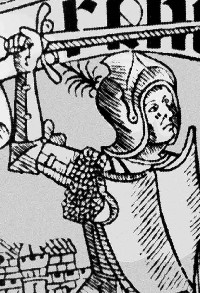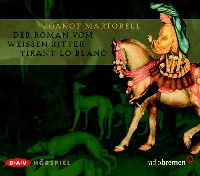

MARTORELL, Joanot (Val�ncia, 1413? � 1465?)

Cavaller i novel·lista originari de La Safor, va escriure una de les novel·les fonamentals del gènere cavalleresc, Tirant lo Blanc, obra que ha estat reconeguda per crítics, lectors i escriptors de tots els temps. La seva vida va transcórrer entre lluites cavalleresques i viatges per Europa, sempre amb plets per qüestions familiars i d’herències. Martorell va escriure altres textos que no ens han arribat en la seva totalitat, com ara la novel·la Flor de Cavalleria i el relat inacabat Guillem de Varoic. Fonamentalment escrita per Martorell, sembla que la novel·la va ser arrodonida i completada a la seva mort per Martí Joan de Galba (m. 1490), un altre cavaller, que es va fent progressivament responsable del darrer quart de la novel·la, per bé que hi ha altres teories que plantegen d’altres escenaris. S’ha dit que Tirant lo Blanc és la millor novel·la europea del segle XV. Ja Miguel de Cervantes, fa dir al capellà al Quixot: “Digoos verdad, señor compadre, que por su estilo es este el mejor libro del mundo; aquí comen los caballeros, y duermen y mueren en sus camas, y hacen testamento antes de su muerte, con estas cosas de que todos los demás libros deste género carecen”. I, Mario Vargas Llosa, descriu l’autor com: “El primer d’aquella llista de suplantadors de Déu – una llista que inclou Fielding, Balzac, Dickens, Flaubert, Tolstoi, Joyce, Faulkner – que busquen en les seves novel·les una realitat que ho abasta tot”.
Edelmann und Roman-Autor aus La Safor. Er ist der Autor eines der wichtigsten Ritterromane schlechthin, des Romans vom Weißen Ritter Tirant lo Blanc, ein Werk, das hohe Anerkennung von den Kritikern, Lesern und Schriftstellern aller Epochen erfahren hat. Sein Leben war eine Folge von Ritterkämpfen und Reisen durch ganz Europa, voll Familien-Querelen und Erbstreitigkeiten. Martorell hat auch andere Texte geschrieben wie Die Blüte des Rittertums oder die unvollendete Geschichte von Wilhelm von Varoic, die jedoch nicht vollständig erhalten sind. Überwiegend von Martorell verfasst, scheint der Roman nach seinem Tod von Martí Joan de Galba (gestorben 1490) abgerundet und vervollständigt worden zu sein. Anscheinend übernahm dieser Edelmann nach und nach die Federführung für das letzte Viertel des Buches, obwohl es auch andere Vermutungen zu diesem Thema gibt. Es gibt Stimmen, die den Roman vom Weißen Ritter Tirant lo Blanc für den besten europäischen Roman des 15. Jahrhunderts halten. Schon Miguel de Cervantes ließ im Don Quijote den Pfarrer sagen: “Wahrlich, mein Herr, aufgrund seines Stiles ist es das beste Buch der Welt. Hier essen die Ritter, schlafen und sterben in ihren Betten, machen ihr Testament vor ihrem Tod, all diese Dinge, die alle anderen Bücher der gleichen Art vermissen lassen.” Und Mario Vargas Llosa beschrieb den Autor als “den ersten in einer ganzen Reihe von Gottes Nebenbuhlern – eine Liste, die Fielding, Balzac, Dickens, Flaubert, Tolstoy, Joyce und Faulkner einschließt –, die in ihren Romanen eine Realität zu schaffen suchen, die alles einschließt.”
A knight and novelist originating from La Safor, Valencia, Joanot Martorell wrote one of the essential novels of the Cavalier genre, Tirant lo Blanc; a work of renown among writers, readers and critics throughout time. His life was spent between knightly battles and voyages across Europe, with ever-present disputes over family and inheritances. Martorell wrote other texts that have not arrived to us in completed form, such as the novel The Flower of Chivalry and the unfinished story William of Varoic. Basically written by Martorell, it seems that the novel was rounded off and completed by Martí Joan de Galba (d. 1490), another knight, who was made increasingly responsible for the last quarter of the novel, despite the fact that there are other theories that offer other scenarios. It must be said that Tirant lo Blanc is the best European novel of the 15th century. As Miguel de Cervantes has the priest say in the Quixote: “I tell you for certain, Sir, that for its style, this is the best book in the world: in it knights eat and sleep and die in their beds, and make their wills before their deaths; those things which are lacking in all other books of this genre.” And Mario Vargas Llosa described the author as: “The head of that list of stand-ins for God – a list that includes Fielding, Balzac, Dickens, Flaubert, Tolstoy, Joyce, Faulkner – who look in their novels for an all-encompassing reality.”
Selected works in translation
- Chinese Qishi Dilang Chu Banshe, 1993
- Dutch Tirant lo Blanc Bert Bakker,1988
- English
- Tirant lo Blanc Schocken Books, 1984
- Tirant lo Blanc Macmillan London Ltd., 1985
- Tirant lo Blanc Peter Lange, 1993
- Finish Tirant Valkoinen Gummerus, 1987
- French Tirant lo Blanc Anarchasis, 2004
- German Der Roman vom Weissen Ritter Tirant lo Blanc Fischer, 1990/2007
- Japanese [Tirant lo Blanc] Iwanami Shoten Publishers (in press)
- Serbian [Tirant lo Blanc] Paideia (in press)
- Swedish Tirant den Vite Interculture, 1994




